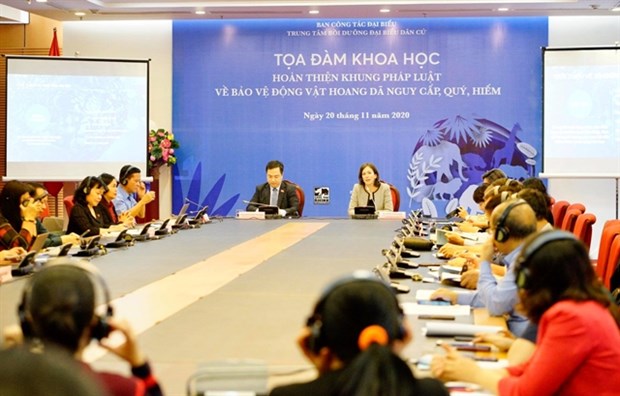Dialogue discusses strengthening wildlife legislation in Vietnam
Thứ Hai, 23/11/2020, 19:25
Strengthening legislation and communications about wildlife protection was the main topic of a discussion held last week in Hanoi.
- Police force requested to strengthen fight against law violations of wildlife protection
- Vietnam to honour contributors to wildlife conservation during 2010-2020
- MPS of Vietnam, U.S Department of Interior sign deal on fight against wildlife trafficking
- Businesses in Vietnam pledge to fight illegal wildlife consumption
 |
|
Participants discuss strengthening legislation and communication on wildlife protection at a dialogue in Hanoi on November 20 (Photo: VNA) |
Strengthening legislation and communications about wildlife protection was the main topic of a discussion held last week in Hanoi.
The event that was organised by the National Assembly Committee for Deputy Affairs in collaboration with wildlife trade monitor network TRAFFIC and Save the Rhino International, bringing together 50 deputies and conservation experts to discuss long-term wildlife legislation and communication strategies in Vietnam.At the event, participants focused on how national conservation laws could be strengthened to improve enforcement and ways in which communications campaigns could best support wildlife legislation.
NA deputies and experts also discussed the need for harmonisation and a clear delineation of responsibilities in future wildlife protection legislation. A lack of clarity in present laws was put forward as the main factor mitigating effective enforcement.
They heard that Vietnam had made progressive achievements in enacting legal tools to end wildlife trafficking. However, there is a need for improvement in some legal frameworks and policies. The National Assembly supports these efforts and encourages government leaders at all levels to come together to counter wildlife crime.
At the event, TRAFFIC shared experience and lessons learned on the application of social and behaviour change communications (SBCC) to support laws against the use of rhino horn, ivory, and other illegal wildlife products. SBCC is an evidence-based communications approach designed to promote and sustain positive behaviour by delivering culturally specific messages to multiple levels of society.
TRAFFIC has pioneered the application of SBCC to stop illegal wildlife trade in Vietnam. Sarah Ferguson, director of TRAFFIC in Vietnam, shared the plan to drive down demand for illegal wildlife products and called on government officials to step up as agents of change against wildlife crimes.
Despite government efforts, Vietnam remains a transit and destination point for illegal wildlife trade. Discussion points and recommendations will be collected into a reference guide to be kept in the National Assembly Library and used to drive the development of effective future wildlife legislation and communication measures to counter wildlife trafficking.
VNA

